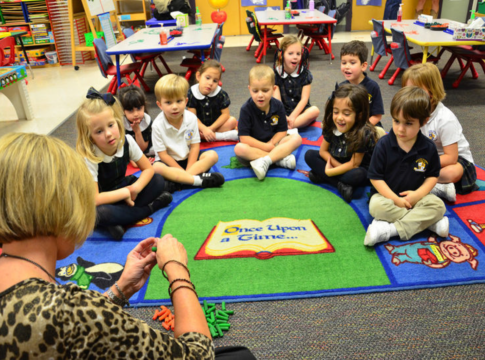Children in the digital era need an education path that best utilizes their potential, ambition and dreams towards a constructive purpose.
For this it is essential to start developing their innovational and creativity skills at an early age; yet with the current educational system focusing on curricula requirements, test results, piles of homework, and a continued pressure towards academic or sports activities, we ignore building their character in a dynamic and digital era. In a book by Wagner, an eminent Hravard researcher in the field of child innovation, Creating Innovators: The Making of Young People Who will Change the World, he has revealed that “The average child asks 100 questions a day,” he says. “But by the time a child is 10 or 12, he or she has figured out that it’s much more important to get right answers than to keep asking thoughtful questions.”
Cultivating children’s minds up to their 10 and 12 years of age, needs to utilize their God given skills by integrating playing into learning rather than education as the core process for developing their knowledge. It is essential to utilize their passions, risks taking and curiosity through playing towards a concrete purpose. If a child’s innovative and creativity skills are strengthened when teachers play into curriculum, it unleashes fun into the learning process, along with the courage to take their natural curiosity and passion as the driver that leads their learning process, a pattern that will lead them to become better and creative problem solvers and look beyond the traditional manners in solving challenging issues, while making education ultimately a joyful and fun ride.
Some of the successful cases start by families who follow their children’s instincts for adventure, or business trials that reflect upon the success of the process.
Abdul Rahman Khalid, Ali Ahmed, and Ibrahim Amr, are all 13 years old, they thought to invest their time during the summer holidays away from entertainment with the PlayStation, they took the simple idea of offering lemon juice with mint to passers-by on the street and called it “Crazy Lemon”. Parents encouraged their children, as Dr. Abeer, Ibrahim’s mother, prepared the lemon juice for her son and his friends every day and provided them with a table setting in front of the house with cups, the pedestrians in the street enjoying its taste and quality loved the idea and price and the project went forward from there. As a financial investment, the average daily earnings reach LE 250, with part of the money distributed equally among the three partners, another part to develop the project along with the costs for the following day, and a part spent on charity. As for the development of their project, Ibrahim wants to present a musical show by playing his guitar in front of the project’s table, being his favorite hobby, and thus attract more pedestrians in the streets.
On the other hand, Maya Hisham, a 5 year old girl asked her mother Alaa Atef; that “At the school library kids exchange books, why not rent games and toys ? Mom, when I grow older I will rent my games to my friends and all the children, provided they play with them and keep them in a good condition and then return them to me again”. The mother said, “Why wait for years ?! I will help you develop this idea into a project. Actually, Maya and Alaa, as well as, her sister Liana, have set up the project called “Sharing Toys Sharing Fun” and children who play with Maya’s toys at school are photographing themselves and sending pictures to her, which makes her happy. Such a project, though simple in its nature, has brought much joy to kids who play with new toys as well as money to the idea’s founders.
Joy and happiness are a key to higher performance, kids bring joy to older people, an Emirati newspaper reported the appointment of an 8-month year old baby as an “employee of happiness” at the UAE’s General Civil Aviation Authority, a move that is the first of its kind in the business world. Sief Mohamed El Sweedy, the General Manager of the UAE General Authority for Civil Aviation, decided to appoint Mohammed Al Hashemi, the son of one of the employees of the General Authority as an “employee of happiness”, to visit the offices of the General Authority every day on official working hours to instill a spirit of happiness and positiveness around the offices.
In Finland, the top country in education systems, the early age teachers have masters degrees, understanding that building a character starts at these early stages is essential in setting the kids foundations in a manner that best serves the country in building its future citizens.
Along with our focus to building bricks, it is essential as well to focus on building our future citizens character through well qualified and professional educators during their primary years who can implement the vision of utilizing our children’s capabilities, innovational and creativity skills by integrating play rather than pressure into a curriculum that does not burden them with tests and homework’s, but develops their personal, team-working skills and ethics into actual problem solving quests.
If we are going to start in September, 2018 the new curriculum set by the Ministry of Education, then along the coming month and to this date those teachers associated with these early stages, should be well equipped to act as Maya’s and Ibrahim’s moms, as well as, equipped with cultivating ethics as the foundations of our beliefs and constitutional rights, and finally execute their job of teaching through the play theory that can unleash the kids full potential. With such a mix Egypt can plan its future generation that in twenty years inject the economy with a world class human power that can serve the country’s future and the world’s towards better prospects.


